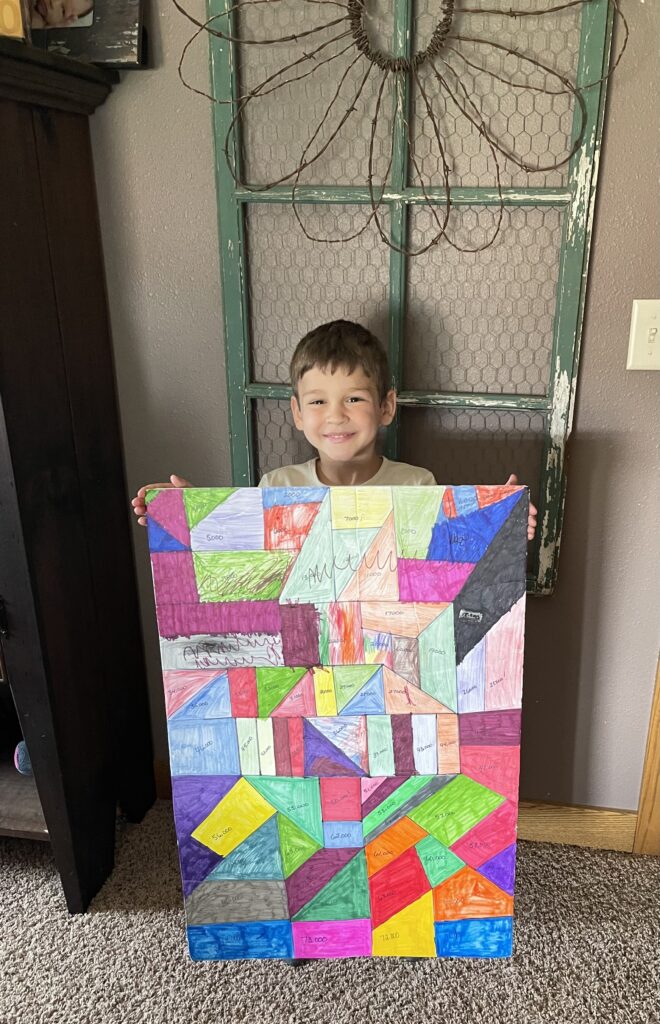Did you know that the average American household has $104,215 worth of debt?
This is according to Experian, and this amount of debt is up 11% from 2020, when the average total consumer debt was $92,727.
My husband and I were this same statistic, we were drowning in debt, we had over $100k of debt in 2020 and we came up with a plan to pay it off quickly. We ended up paying off our debt and putting $5k into our emergency savings fund within 2 years.
During this journey, we spent a lot of time learning about personal finances and teaching our 3 boys about money. This was very important to me, as I don’t want my children to make the same mistakes I made.

Our youngest son, Colton, often asks me and my husband how much money things cost. When I come home with a new shirt or we purchase something for our home, he is always wanting to know how much it was. This annoys my husband and I secretly smile because I know our son is thinking about money, budgeting (even if he doesn’t know this is what he is doing), and how to buy things.
Money is in almost everything we do, so we need to teach our kids how to manage it, save it, and earn it. I want you to teach your kids about debt and how you can use debt as a tool, but you need to be very responsible with it. I want to teach my kids to save up money and buy things in cash as much as possible. Just because you can “afford” the monthly payment doesn’t mean you can afford it.
We need to teach our children to pay themselves first, minimize debt, save for their future, and hopefully set them up to not live paycheck to paycheck. Teaching these in crucial for their financial future and we want to set our kids up to have a strong financial foundation. I know I don’t want my kids to struggle and I bet you don’t want your young ones to struggle.

Growing up, I didn’t learn a lot about money but I was taught one very important financial lesson that I am forever grateful for and that was to never get into credit card debt. My parents would always say, “It’s okay to use a credit card, but you need to pay it off in full every month.” And so I did and I never got into credit card debt. However, beyond that, I didn’t know much about money and finances.
I remember when I went to buy my first vehicle on my own, I told my dad I had no clue how to figure out how much I could afford to spend. I took out some student loans, luckily not a lot and my parents also helped me pay for some of my college and I also worked while I went to school, but I didn’t realize which loans I would have to pay back and which ones I wouldn’t. I didn’t realize I would have different loans with different interest rates.
These are the things we need to teach our kids and if we don’t understand this ourselves, we need to learn it together.
Defining what debt is in simple terms is essential for kids. Understanding debt and how it works will help kids avoid financial struggles later in life. It isn’t a one stop one conversation that you need to have with each of your children, this is a topic that should be discussed often.
Age-Appropriate Lessons About Debt
- For Young Kids (Ages 5-10):
- Teach the basics of borrowing (e.g., borrowing toys or books).
- Introduce the idea of “paying back” through small tasks or games.
- For Tweens (Ages 11-13):
- Explain credit cards and interest using real-world examples.
- Use allowances or small loans to teach the concept of repayment. I actually suggest having the child earn the money first, then make the purchase.
- For Teens (Ages 14-18):
- Talk about student loans, car loans, and credit card debt.
- Explain how interest can make purchases more expensive over time.
- Introduce credit scores and their impact on financial opportunities.
There are practical ways to teach your kiddos about debt including using real life examples, the best ones being your own experiences with debt, this can be both positive and negative. Even though I am a financial coach I am not 100% against debt, say what?!?
Show your kids how debt works in family scenarios, like buying a house or car. How using debt to build a business or going to school can be an investment in their future.

I also suggest playing board games like Monopoly or using an app that teaches money management is a great idea for kids. You can also give them a small “loan” for something they want and charge them “interest”. This is a great learning lesson. I would MUCH rather have my kiddos make money mistakes when it is say, $100 or less versus thousands of dollars when they are an adult. That would be a much more expensive mistake.
I encourage you to create an open and honest environment where your kids feel comfortable asking questions related to money. If they can’t ask you, who are they going to ask? If you don’t teach them about money, where are they going to learn it?
Be sure to check out my other blog post on How We Are Teaching Our Boys To Be Responsible With Money. https://jesswaynecoaching.com/how-we-are-teaching-our-boys-to-be-responsible-with-money/
Here are a few common mistakes to avoid when teaching kids about debt.
- Avoid Overwhelming Them: Stick to age-appropriate explanations
- Don’t Scare Them: Focus on the responsible use of debt rather than fear.
- Be Honest Without Being Negative: Share lessons from your own mistakes without instilling fear of failure.
- Boring Talks: Don’t go on and on with money talks, keep it short and sweet and to the point. Don’t bore them with all kinds of details, these are kids!
Encourage your kids to have good habits to prevent overwhelming amounts of debt. Teach them to save first, with every “paycheck” they get, whether that be babysitting money, money from chores, or birthday gift money, teach them to save a portion of it first. Instill smart spending habits and help them prioritize needs over wants.

As your kiddos get a little older, it is more than appropriate to help them create their own budget or spending plan. This can be something you start in their early teens or later teens, before they head off to college or graduate high school.
Kids learn most by watching what you do, not what you say. Model healthy spending habits and responsible money management. Show them how you pay your monthly bills and how you determine if you can afford that new pair of shoes or go to the restaurant. If you have debt, SHOW them what you are paying monthly in interest versus the principal balance and amount you are paying. I can guarantee this will be eye-opening for both of you!
When we were paying off our debt, we created a debt payoff tracker, which we made with an old poster board we had lying around the house. When we made this we were down to $75k left of debt to payoff. We drew 75 shapes on the poster board and each shape represented $1k of debt. Every time we paid off $1k of debt, we colored in a shape. This helped keep us motivated and on track. In fact, our boys used to argue over who got to color in the shape each time.

Teaching your kids about money and debt isn’t just important for them—it’s valuable for you as a parent too. By helping your children build a strong financial foundation now, you’re setting them up for long-term success with their finances.
While they might roll their eyes during the lessons, trust me—they’ll thank you someday. Giving them the tools to understand and manage money is a gift that will benefit them for the rest of their lives.
My websitewas designed using 100% solar power
back to top
Follow along
Listen to the podcasts
